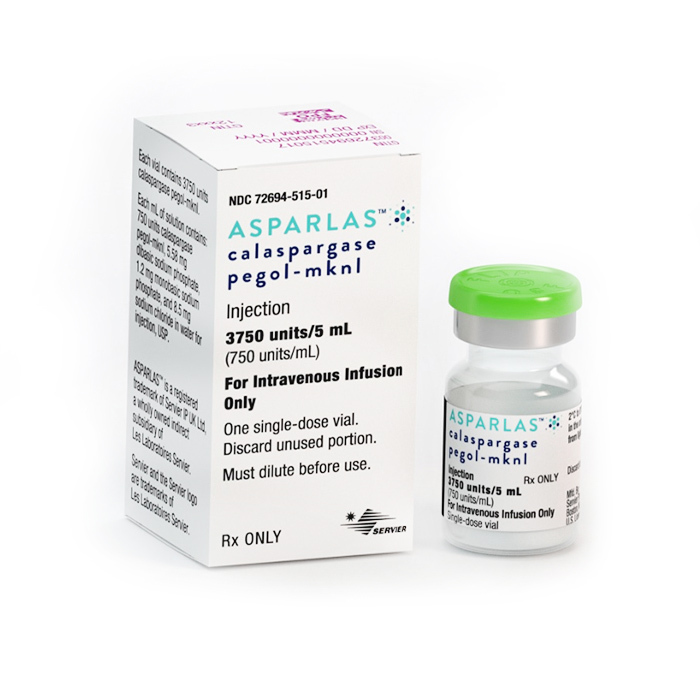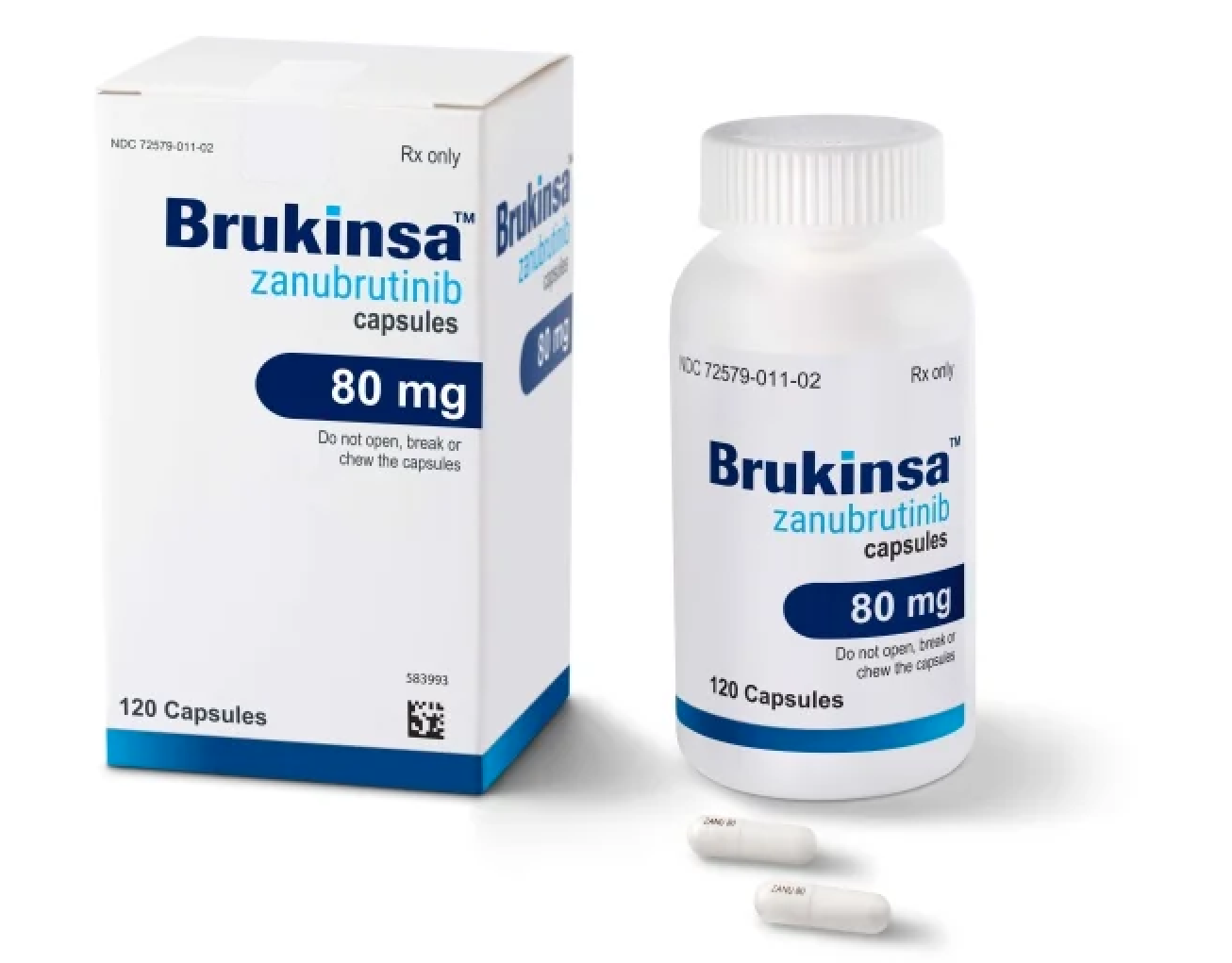Asparlas (calaspargase pegol-mknl) vs Brukinsa (zanubrutinib)
Asparlas (calaspargase pegol-mknl) vs Brukinsa (zanubrutinib)
Asparlas (calaspargase pegol-mknl) is a chemotherapeutic agent specifically used in the treatment of acute lymphoblastic leukemia (ALL) in pediatric and young adult patients, functioning as a form of enzyme replacement to deplete the amino acid asparagine, which is essential for the growth of leukemia cells. On the other hand, Brukinsa (zanubrutinib) is a targeted therapy known as a Bruton's tyrosine kinase (BTK) inhibitor, used for the treatment of mantle cell lymphoma (MCL), Waldenström's macroglobulinemia, and chronic lymphocytic leukemia (CLL) by blocking BTK, which is necessary for the growth and spread of cancer cells. The choice between Asparlas and Brukinsa would depend on the specific type of blood cancer a patient has, as they are not interchangeable and are used to treat different conditions.
Difference between Asparlas and Brukinsa
| Metric | Asparlas (calaspargase pegol-mknl) | Brukinsa (zanubrutinib) |
|---|---|---|
| Generic name | Calaspargase pegol-mknl | Zanubrutinib |
| Indications | Acute lymphoblastic leukemia (ALL) | Mantle cell lymphoma (MCL), Waldenström's macroglobulinemia, Marginal zone lymphoma, Chronic lymphocytic leukemia/small lymphocytic lymphoma |
| Mechanism of action | Asparagine-specific enzyme which results in depletion of the amino acid asparagine and inhibition of protein synthesis in leukemic cells | Bruton's tyrosine kinase (BTK) inhibitor, which helps to block the growth of cancerous cells |
| Brand names | Asparlas | Brukinsa |
| Administrative route | Intravenous | Oral |
| Side effects | Allergic reactions, elevated liver enzymes, pancreatitis, blood clotting abnormalities, etc. | Neutropenia, thrombocytopenia, anemia, diarrhea, bruising, etc. |
| Contraindications | History of serious hypersensitivity reactions to pegylated L-asparaginase | Hemorrhage, infections, cytopenias, atrial fibrillation/flutter, hypertension, etc. |
| Drug class | Antineoplastic Agent, Enzyme | Bruton's tyrosine kinase (BTK) inhibitor |
| Manufacturer | Servier Pharmaceuticals | BeiGene |
Efficacy
Efficacy of Asparlas (calaspargase pegol-mknl) in Leukemia Treatment
Asparlas, known generically as calaspargase pegol-mknl, is a chemotherapy medication specifically designed for the treatment of acute lymphoblastic leukemia (ALL) in pediatric and young adult patients. It is a modified form of L-asparaginase, an enzyme that depletes the amino acid asparagine. Leukemia cells, particularly those in ALL, require asparagine to grow and proliferate. By depleting asparagine, Asparlas starves the leukemia cells and inhibits their growth. Clinical trials have demonstrated that Asparlas, when used as part of a multi-agent chemotherapeutic regimen, is effective in achieving and maintaining remission in patients with ALL. Its efficacy is comparable to that of native L-asparaginase, with the added benefit of a prolonged circulation time in the body, which allows for less frequent dosing.
Efficacy of Brukinsa (zanubrutinib) in Leukemia Treatment
Brukinsa, with the generic name zanubrutinib, is a Bruton's tyrosine kinase (BTK) inhibitor used in the treatment of mantle cell lymphoma (MCL), a type of leukemia. While MCL is not the same as ALL, it is another form of leukemia where BTK plays a critical role in the proliferation, survival, and migration of malignant B cells. Zanubrutinib has been shown to be highly effective in inhibiting BTK, leading to the death of cancer cells. Clinical trials have indicated that Brukinsa is effective in inducing responses in patients with MCL, particularly in those who have received at least one prior therapy. Its efficacy is seen in the high rates of complete and partial responses, as well as the duration of these responses in treated patients.
It is important to note that while both Asparlas and Brukinsa have shown efficacy in the treatment of certain types of leukemia, their use is specific to the type of leukemia and the patient's individual treatment plan. Asparlas is tailored towards ALL, particularly in a younger demographic, while Brukinsa is indicated for MCL in adults. Their efficacy is also influenced by various factors, including disease stage, prior treatments, and patient-specific characteristics.
In conclusion, Asparlas and Brukinsa represent important components in the treatment of different types of leukemia. Their development and approval have provided clinicians with more targeted options for therapy, which can lead to better outcomes for patients. As with all medications, the efficacy of these drugs must be evaluated on a case-by-case basis, and their use should be integrated into a comprehensive treatment plan developed by healthcare professionals specializing in oncology.
Regulatory Agency Approvals
Asparlas
-
Food and Drug Administration (FDA), USA

Brukinsa
-
European Medical Agency (EMA), European Union

-
Food and Drug Administration (FDA), USA

Access Asparlas or Brukinsa today
If Asparlas or Brukinsa are not approved or available in your country (e.g. due to supply issues), you can access them via Everyone.org.
How it works

Make an enquiry
Choose the medicine you want to buy, answer a couple of questions, and upload your prescription to speed things up. We’ll get back to you within 24 hours.


Make an enquiry
Choose the medicine you want to buy, answer a couple of questions, and upload your prescription to speed things up. We’ll get back to you within 24 hours.


Breeze through the paperwork
We'll guide you through the required documents for importing unapproved medicine, ensuring you have all the necessary information.


Get a personalized quote
We’ll prepare a quote for you, including medicine costs and any shipping, administrative, or import fees that may apply.


Receive your medicine
Accept the quote and we’ll handle the rest - sourcing and safely delivering your medicine.

Some text on this page has been automatically generated. Speak to your physician before you start a new treatment or medication.
Let's talk
If you have any questions, call us or send us a message through WhatsApp or email:
Contact us




